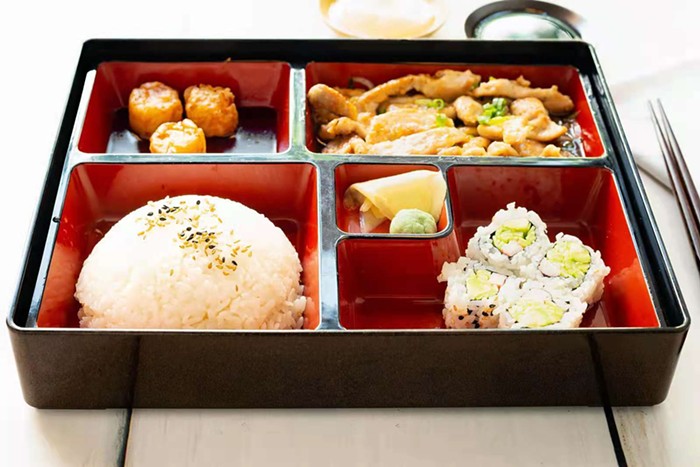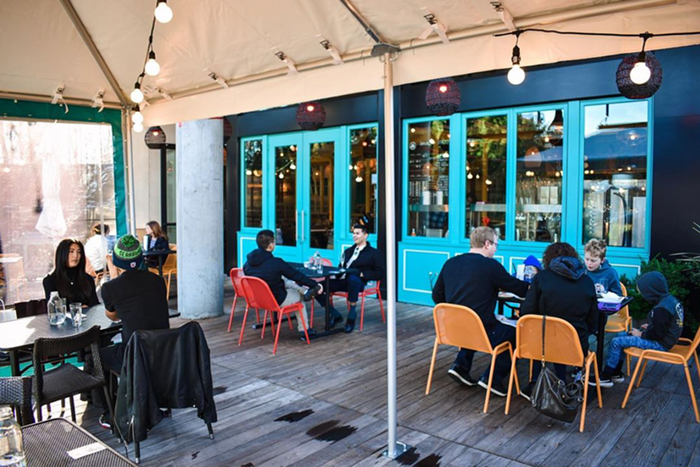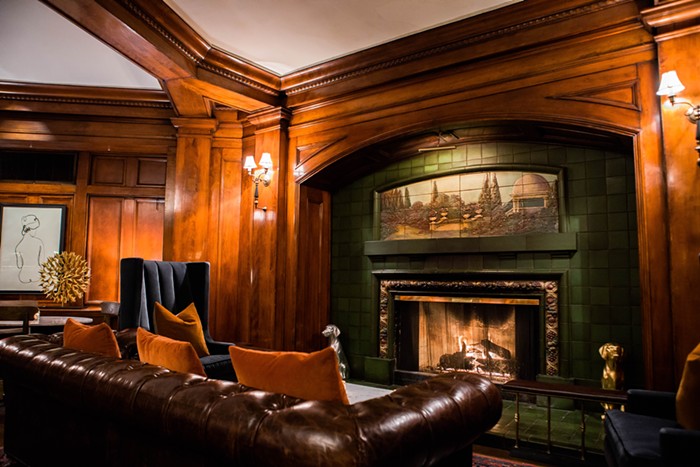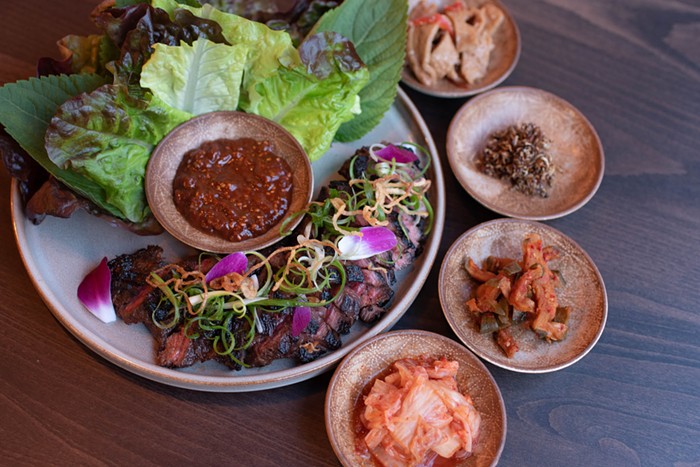The problem with what's become known as communal dining is that the "community" involved is joined together by (1) liking food and (2) having enough expendable income to go to a restaurant to eat it. You'd think there would also be a third commonality, i.e., enjoying meeting new people who also eat food and have money, but this seems less and less frequently to be the case. Communal-table diners—at least in Seattle—are more and more content to cordially ignore each other, treating the experience as a fancy cafeteria.
And it makes perfect sense to do so. If you're seated next to a couple ostentatiously (and blandly, and at great length) discussing their most recent trip to Napa, you may want to pretend they're not there. (This happened at one of Kurt Timmermeister's otherwise lovely, now defunct Cookhouse dinners at his farm on Vashon Island.) If you're seated across from a woman describing how because of her metal allergy, the back of the button on the waistband of jeans always gives her a rash, you may want to pretend you're not there. (This happened at Ballard's otherwise pretty Belle Clementine.)
The other option is to bring a large enough party that you have a comfortable buffer between yourself and anyone using the word "foodie"—or, better yet, to fill up the whole table with people who you share some kind of bond with. But etiquette sticklers will note that if you invite others to dine out, you are conventionally expected to pay; if you can get past this hurdle, there's still getting the whole herd organized.
On the Boards has solved the communal dining conundrum by starting with an actual community: the people who go to see the avant-garde dance, theater, and other sometimes-difficult-to-categorize art that happens there. The Studio Suppers series takes place downstairs in the Studio Theater on select opening nights this season; afterward, the entire audience goes up to see the performance.
As someone said at last Thursday's Studio Supper, performances at On the Boards can be many things, but they are never boring. Then someone else said, "Not true—but if they are boring, they're boring in an interesting way." A crowd of people attending a show at On the Boards is full of the curious, the determinedly unbored; it is a crowd united by more than having mouths and wallets. It is a really fun crowd—unpretentious supporters of the arts who keep any rashes they may have to themselves, at least at the dinner table.
The Studio Suppers also feature great chefs. Cormac Mahoney of Madison Park Cafe and Johnathan Sundstrom of Lark have already done dinners. Coming up: Maria Hines of Tilth, Golden Beetle, and the upcoming Agrodolce; and then Ethan Stowell of Tavolàta and all his other places through new Rione XIII; Mike Easton of Il Corvo; and then more TBA. The Studio Suppers are also a bargain: $25 to $100 per person, sliding scale, so that, as artistic director Lane Czaplinski said at last week's Sundstrom supper, "People who don't make as much don't have to pay as much, and people who make more can pay more. I think that's what Obama was talking about!" This was met with nearly uproarious applause—this is also an incurably liberal crowd—probably abetted by the pre-dinner cocktail hour and free-flowing wine, all included in the from-each-according-to-their-ability price. (Tickets go on sale 14 days in advance and have been selling out in a matter of hours; the show upstairs requires a separate ticket, generally around $20.)
The Studio is outfitted with two austerely handsome blond wood tables for its Suppers. Each seats 25, with, importantly, elbow room; even if strangers are like-minded, you don't want to be sitting in their laps. The tables are suspended on thin cables from the ceiling, lit from above and by candles; they swing almost imperceptibly from side to side, a movement that, along with the surrounding darkness, serves to unmoor you slightly, like you might be dining in the hold of a very contemporary ship.
Sundstrom came out and discussed the menu—the tiny, crispy toasts spread with white bean hummus topped with kale and truffle butter we'd enjoyed in the lobby, along with a Maker's-Mark-and-champagne cocktail; the baby mustard greens, roasted delicata squash, and agrodolce that surrounded a big blob of exquisitely creamy burrata sitting in front of us (he described burrata as fresh mozzarella on steroids; I'd say on Valium); the chunks of beef short ribs with tender cupped leaves of brussels sprouts, then the chocolate truffles from Autumn Martin of Hot Cakes bakery, yet to come.
Among a few—importantly, not too many—people thanked along with Sundstrom and Martin was a gentleman from J. Lohr winery, which has donated all the wine for the year ("FOUR MORE YEARS!" someone shouted). He proved to be sitting next to me, and we talked about the winery's provision of habitats for owls, bats, and raptors for natural pest control, and how they'd spent quite a bit of money to install a solar array, leading to last month's electric bill being $9. On my other side, a very poised teenager discussed the show she'd liked best at On the Boards recently (Gob Squad, reinterpreting Andy Warhol) and how she liked the food ("Yummy stuff!"). The only typical communal-table awkwardness that occurred was when the short ribs came out and got all dished out, leaving a couple of people further down out in the cold. They looked panicked, but another helping was brought soon.
Aside from the pools of light on the tables, there were a few flashlights beaming across bottles of water set upon risers at one side of the room, and a projection of blurry photos of the desert on the facing wall. These proved to be the only allusions to the show that was to follow, which, all things considered, was for the best—the performance, by Mexico City's Teatro Línea de Sombra, was an unmooring, vivid, surreal contemplation of illegal immigration from the other side of the wall. It made the bounty that preceded it seem obscene, but it would've seemed more so to shoehorn a presentation or discussion about it into the dinner, or (horribly) to serve Mexican cuisine. Communal dinners often try to stuff politics into the dinner, talk at the diners too much, and/or try to tie it all into a tidy thematic bow. But On the Boards has never been afraid of untidiness, or obscenity, for that matter. ![]()



















